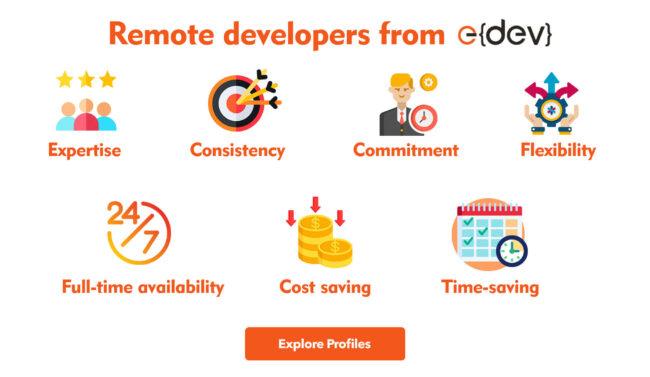How to Hire Remote Developers in the Modern Work Landscape?
In today’s fast-paced digital landscape, hiring a dedicated remote developer has become more than just a trend—it’s a strategic necessity. As businesses seek to scale and adapt to evolving technology demands, the flexibility and expertise offered by remote developers can be a game-changer. However, navigating the remote hiring process can be challenging, from understanding the benefits to grappling with the nuances of hiring freelancers, part-time, or full-time remote developers. In this blog, we’ll guide you on how to hire remote developers, including why you should consider it, the challenges you might encounter, and the different types of remote developers available.
Who are Remote Developers?
Remote developers are skilled professionals who work from locations of their choice, often outside the traditional office setting. They are highly sought-after individuals with expertise in various programming languages, software development, and web development. Remote developers can be freelance developers, contractors, remote employees of a company, or part of an offshore or nearshore development team. They bring a wealth of technical knowledge and experience to the table, making them invaluable assets for businesses looking to expand their development capabilities and adapt to the evolving landscape of work in the digital age.
How are dedicated remote developers different from freelancers and part-time contractors?
Dedicated remote developers, freelancers, and part-time contractors all offer distinct advantages and cater to different business needs.
Dedicated Remote Developers:
Dedicated remote developers are full-time remote employees of a company or offshore/nearshore team members for a specific project, who work from remote locations.
Full-Time Commitment: Dedicated remote developers are just like an in-house team member who is fully committed to the success of a project and do not work on other projects simultaneously.
Flexible Collaboration: Remote employees are typically committed to the company for the long term, offering stability and consistency whereas dedicated remote developers can be hired on a short-term or long-term basis based on the project requirements.
Cost savings: Remote developers hired from emerging tech markets across borders with flexible collaboration options offer more cost savings than hiring from a local talent pool within your country.
Integration: Dedicated remote developers become an integral part of the company’s culture and team, often participating in meetings and projects as core members.
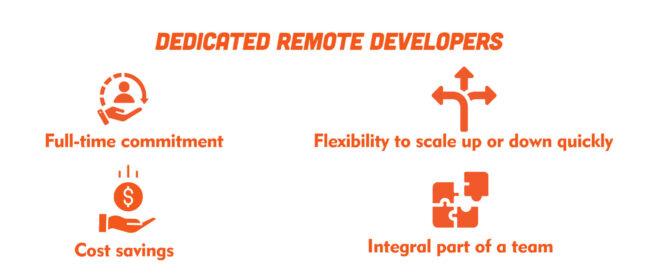
Part-Time Contractors:
Partial Commitment: Part-time contractors work for a company on a part-time basis, which can be ideal for businesses that don’t require full-time help.
Cost Savings: This arrangement can be more cost-effective, as you’re only paying for the hours or work required.
Limited Availability: Part-time contractors may have other commitments, so their availability can be limited.
Freelancers:
Freelancers are independent professionals who work on a project basis.
Flexibility: They offer flexibility in terms of availability and can be hired for short-term or specific work.
Variable Commitment: Freelancers may work on multiple projects simultaneously for different clients, and they’re not tied to any single company.
Varied Expertise: Companies can choose freelancers with specialized skills for specific tasks.
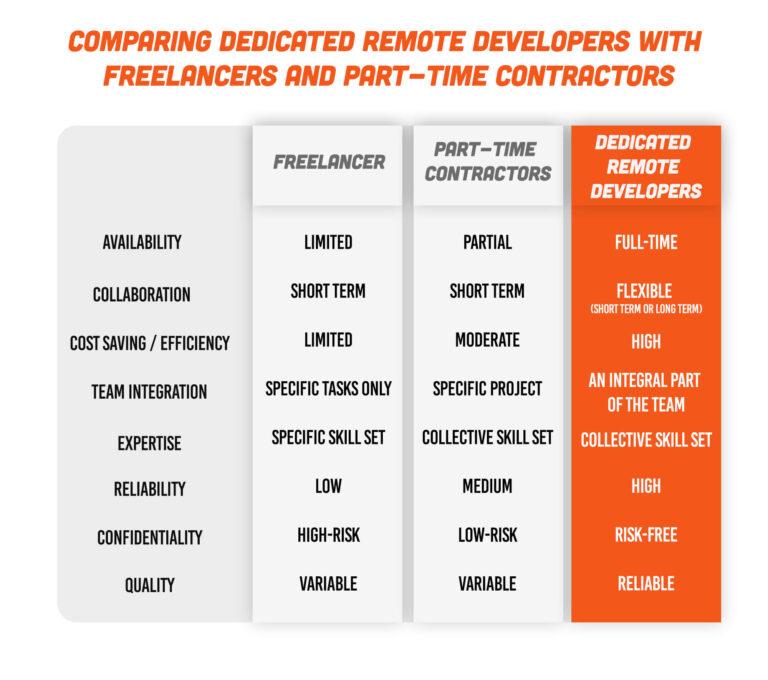
The choice between these options depends on your business needs, budget, and the level of integration you require. Dedicated remote developers are ideal for long-term, core team members. Freelancers offer flexibility and specialized skills for short-term projects. Part-time contractors can be a cost-effective solution for part-time assistance. Companies often use a combination of these to meet their varying development requirements effectively.
How to Hire Remote Developers for your project?
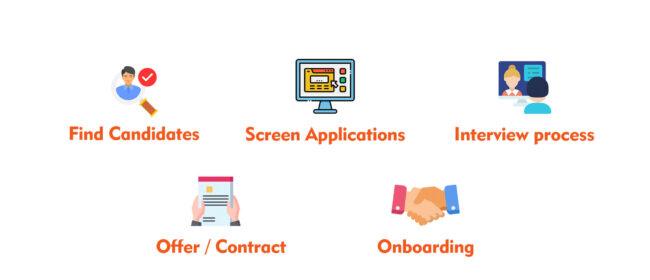
1. Find Candidates:
- Begin your search for remote developers by posting job listings on specialized job boards & websites, LinkedIn, GitHub & GitLab
- For short-term work, you can look for freelance developers on platforms like Fiverr, Upwork, and Freelancer which have extensive pool of freelance developers.
- For dedicated hires, Partner with specialized companies like e{dev}, Turing, Revelo, Lemon.io, gun.io, arc.dev, Skipp, Howdy, etc. which help you hire, pay, and manage remote developers or build a remote development team from scratch.
- These companies are valuable resources for businesses looking to leverage remote talent without the complexities of recruitment, payroll, compliance, and management. They can be particularly beneficial for companies that are new to remote work or those seeking a more streamlined approach to building and managing their remote development teams.
- Actively network with developer communities and ask for referrals.
- Engage with recruitment agencies or headhunters that specialize in remote developer placements. They can help you find the right talent and manage the hiring process.
2. Screen Applications:
- Review resumes, portfolios, and cover letters to assess candidates’ qualifications and relevant experience.
- Create a shortlist of candidates who meet the basic requirements for the role.
- Pay attention to details, like the technologies they’ve worked with and the scale and complexity of projects they’ve handled.
3. Interview:
- Conduct soft skills interviews to evaluate communication, collaboration, time management, and adaptability.
- Follow up with technical interviews to assess their coding abilities, problem-solving skills, and knowledge of relevant tools and languages.
- Ask about their remote work experience, their preferred remote work setup, and their ability to work independently.
4. Make an Offer:
- Once you’ve identified the ideal candidate, extend a formal job offer or contract based on the term or type of employment.
- Be prepared to negotiate and discuss terms until both parties are satisfied.
- Confirm the candidate’s commitment and start date.
5. Onboard:
- Develop a comprehensive onboarding process that familiarizes the new remote developer with your project, expectations, company culture, and goals.
- Provide access to necessary tools and systems for seamless integration into your workflow.
- Schedule regular check-in meetings and maintain open lines of communication during the onboarding phase to ensure a smooth transition into the role.
By following these detailed steps, you can effectively identify, evaluate, and onboard remote developers who are well-suited for your project.
e{dev} simplifies your recruitment process, freeing up your time and energy for project operations. We specialize in custom hires that align with your project’s unique requirements. Our extensively screened dev experts seamlessly integrate with your team, enhancing your workforce effortlessly. Our platform provides an end-to-end solution to hire, manage, and track the performance of, remote developers.
Why You Should Hire Dedicated Remote Developers?
Hiring remote developers offers a range of valuable benefits that extend beyond geographical boundaries. These skilled professionals bring diverse expertise and fresh perspectives to projects, fostering innovation and creativity. Here are some of the major benefits of hiring remote developers
- Access to a Global Talent Pool
One of the most compelling reasons to hire remote developers is access to a global talent pool. You’re not limited by geographical boundaries, allowing you to tap into a diverse range of skills and experiences. This global perspective can lead to innovative solutions and fresh insights for your projects. - Cost-Efficiency
Hiring remote developers can be cost-effective. You can often find skilled professionals in countries with lower living costs, which can translate into more budget-friendly rates compared to hiring locally. Additionally, you save on office space, equipment, and other overhead expenses. - Increased Productivity
Remote developers often have more flexibility in managing their time, which can lead to increased productivity. Many work best during their most productive hours, resulting in high-quality work delivered efficiently. - Scalability
Remote hiring allows you to scale your team up or down as needed. Whether you have a short-term project or are looking for a long-term collaborator, you can adjust your team size accordingly without the constraints of a physical office.
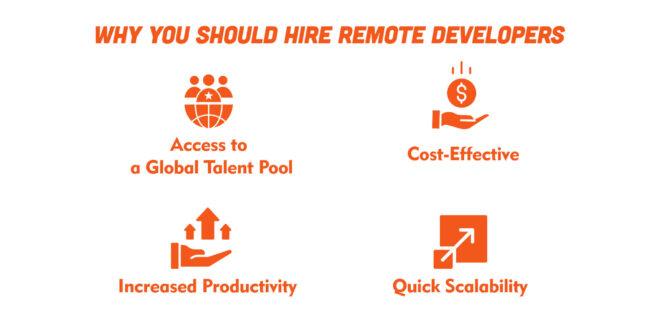
With the ability to tap into a global talent pool, businesses can assemble specialized teams tailored to their unique needs, ensuring optimal solutions. Remote developers offer flexibility, allowing for rapid scaling or project adjustments, all while reducing operational costs associated with on-site teams. Their collaborative efforts, facilitated by modern communication tools, lead to efficient project execution, timely deliveries, and a dynamic development process that embraces the evolving nature of the digital landscape.
Challenges of Hiring Remote Developers
While there are numerous advantages to hiring remote developers, there are also challenges that you should be aware of:
- Communication Barriers
Effective communication is crucial for successful collaboration, and remote work can sometimes create communication barriers due to time zone differences, language barriers, or the absence of face-to-face interaction.Solution: Employing the right tools and establishing clear communication protocols can mitigate these challenges.
- Trust and Accountability
Building trust and ensuring accountability can be challenging when working with remote developers.Solution: To address this, you’ll need to establish trust gradually, set clear expectations, and measure performance based on deliverables and results.
- Security Concerns
When you share sensitive information with remote developers, you may have concerns about data security.Solution: Implementing robust security measures and signing nondisclosure agreements can help protect your intellectual property.
- Legal and Tax Considerations
Hiring remote developers from different countries may involve navigating legal and tax complexities, such as compliance with international labor laws and tax regulations.Solution: Consulting with legal and financial experts can help you navigate these issues.
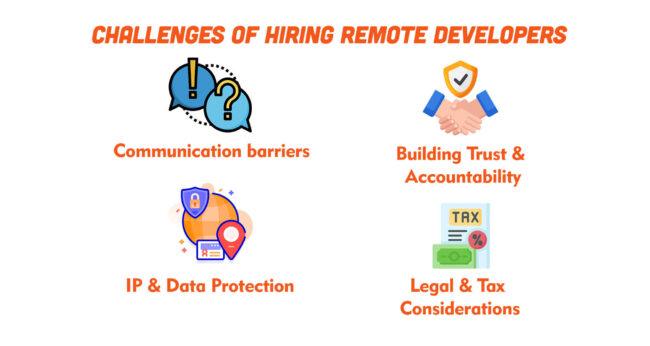
e{dev} is uniquely positioned to mitigate these challenges by providing dedicated remote developers who are not just skilled professionals but also become integral members of your team. We facilitate effective communication through structured onboarding processes, transparent communication protocols, and clear expectations & goals. Trust and accountability are fostered through time & effort tracking and performance-based assessments. e{dev} prioritizes data security, implementing robust measures and confidentiality agreements. Furthermore, their expert guidance on HR, legal, and tax considerations ensures seamless international hiring compliance. With e{dev}, your business can navigate the complexities of remote work with confidence, leveraging a trusted partner for a successful and secure collaboration.
Why dedicated remote developers from e{dev} are better than freelancers or contractors for a startup or small business?
Dedicated remote developers from e{dev} present a compelling choice for startups and small businesses, outshining freelancers and contractors in several key aspects. These dedicated professionals offer a level of consistency and commitment that is invaluable for small teams, working as full-time team members rather than sporadic contributors. Our experienced developers seamlessly integrate with your business, quickly grasping your culture, vision, processes, and goals, reducing the time it takes to get up to speed compared to freelancers or contractors. Their active participation in team discussions and collaborations brings essential expertise to the table, something often lacking with freelancers and contractors who work on various projects. Dedicated remote developers are aligned with your project’s long-term success, making them a more stable and invested choice. This alignment of interests can be challenging to establish with freelancers or contractors who may have short-term goals. Moreover, e{dev} handles much of the management overhead, allowing you to concentrate on core activities. This can save you valuable time and resources compared to managing multiple freelancers or contractors. Our vetted talent pool ensures your access to the best skills, and the scalability of dedicated developers aligns perfectly with the evolving needs of startups and small businesses.
While freelancers and contractors have their place, remote developers from e{dev} offer a holistic and integrated solution, surpassing expectations in terms of commitment, collaboration, and consistency. Their ability to seamlessly align with your team, culture, and long-term vision can drive small businesses to new heights.
Build your remote workforce with e{dev}
In the ever-evolving landscape of work, where remote collaboration and access to global talent have become paramount, e{dev} emerges as a pivotal partner for startups and businesses of all size. e{dev} simplifies the administrative aspects of remote workforce management with its all-in-one platform, offering streamlined hiring & onboarding, hassle-free payments & resource management, expert support in HR, Legal, Account & IT admin, and real-time monitoring of remote resources. As you venture into the new era of remote work, e{dev} provides a dependable pathway to building a robust and skilled remote workforce. With their thorough vetting process, vast talent pool, and commitment to your success, e{dev} stands ready to empower your business with the technical expertise and reliability needed to thrive in today’s dynamic work environment.


